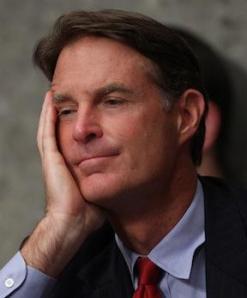Bayh Exits stage right to become a lobbyist for the Chamber of Commerce
Posted: June 7, 2011 | Author: dakinikat | Filed under: Politics as Usual | Tags: Chamber of Commerce, Evan Bayh, lobbying | 14 CommentsOne of the biggest problems in our political system today is the incestuous relationship between former members of  congress that join lobbying firms and their contacts who remain in office. Senator Evan Bayh has decided to become part of the problem.
congress that join lobbying firms and their contacts who remain in office. Senator Evan Bayh has decided to become part of the problem.
Not long after announcing his plans to retire in 2010, then-Sen. Evan Bayh (D-Ind.) offered this bit of commentary on why he’d opted to leave Congress after two terms in office: “I want to be engaged in an honorable line of work.” It was taken as a biting critique of the increasingly polarized and dysfunctional Senate, and a hint that Bayh’s post-Senate plans might include a quiet career in academia, away from politics.
Now Bayh is eating his words. As iWatch News‘ Peter Stone reports, Bayh has signed on with one of the most corporate-friendly, anti-environment shops in all of Washington, DC: the US Chamber of Commerce. According to an internal memo penned by Chamber president Tom Donohue, Bayh, along with former Bush White House chief of staff Andy Card, are now part of the Chamber’s anti-regulation messaging team, doing “speeches, events, and media appearances at local venues.”
The Chamber’s hiring of Bayh, a big name in Washington circles, will only help its efforts to delay or kill new regulatory legislation in Congress. Indeed, Donohue’s memo touts how the Chamber has filed legal briefs to challenge the validity of President Obama’s health care reform bill; successfully delayed a new Securities and Exchange Commission rule on giving shareholders a say on corporate directors; unveiled plans to undermine the clout of the fledgling Consumer Financial Protection Bureau; and delayed a rule forcing companies to disclose when they use conflict minerals from the Congo in their products. Bayh and Card, the memo says, will help the Chamber push this pro-corporate agenda in Washington and beyond.
It’s very difficult to justify this line of work as honorable. Bayh will join the Chamber in denouncing “excessive” regulation among other parts of a clearly right wing agenda. What’s really stinky about this deal is that Bayh used to decry the excessive role of money and lobbyists in national lawmaking.
In a New York Times op-ed in February 2010, Bayh also spoke out against the Supreme Court’s ruling in Citizens United v. Federal Election Commission, which permits corporations and other groups to spend unlimited amounts of money on campaign ads. “The threat of unlimited amounts of negative advertising from special interest groups will only make members more beholden to their natural constituencies and more afraid of violating party orthodoxies,” Bayh wrote. The Chamber, in contrast, was one of the biggest beneficiaries of the ruling and a major spender in the 2010 election cycle.
Evan Bayh has never really been part of many solutions but now he seems destined to become part of the bigger problem.





Recent Comments